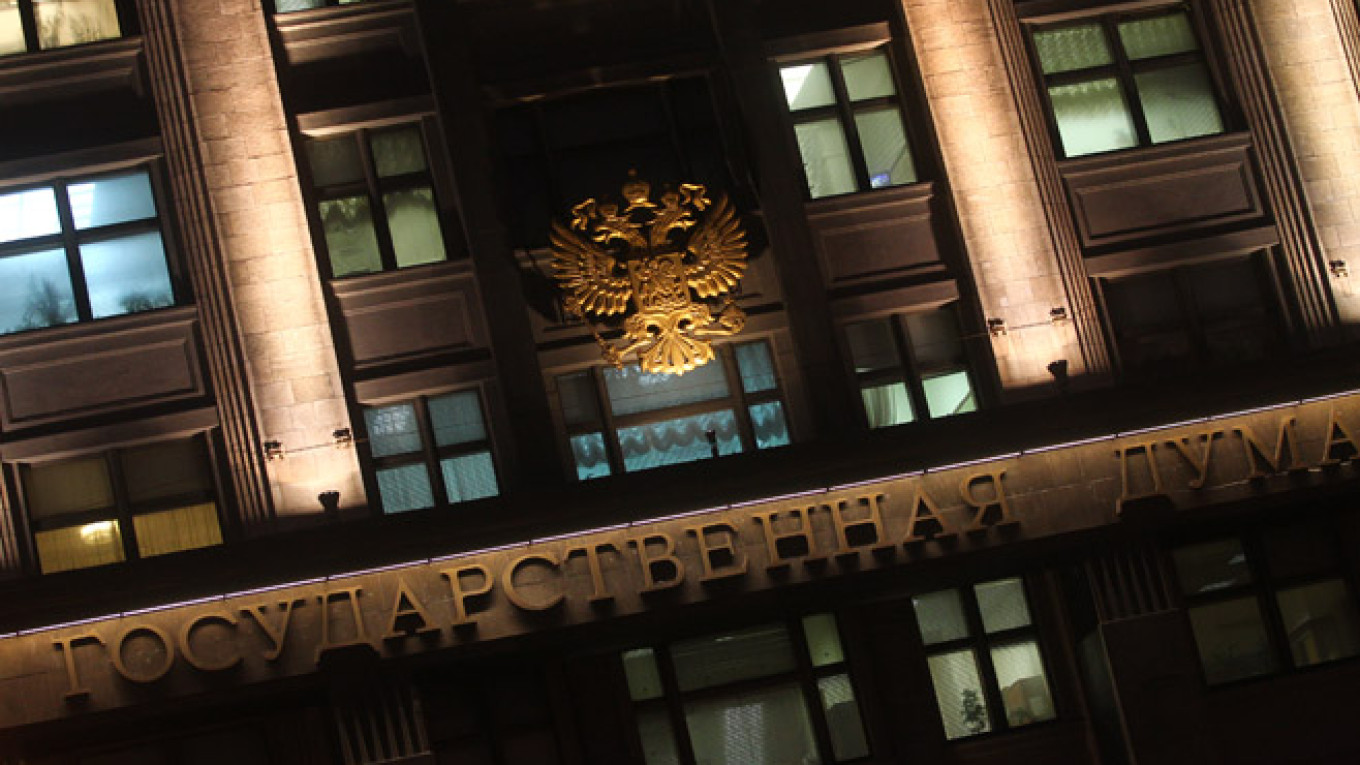Russia's parliament has given preliminary approval to a bill that would prohibit the activities of so-called "undesirable" foreign companies and organizations in Russia, should they be deemed to pose a threat to the state.
The bill, adopted in the first reading Monday, targets any foreign entity seen as "presenting a threat to the defense capability or security of the state, or to public order, or to the health of population," according to the text of the bill released by the State Duma.
Those groups may be declared "undesirable on the territory of the Russian Federation," the bill says, adding that the purpose of the move would be to protect, among other aspects, the "morality" of the nation.
Observers have noted that the bill could provide grounds for the prohibition of any foreign company or organization that officials see as unfriendly.
"If this bill is signed into law, this will be a sign that the state can put pressure on any organization it wants," said Nikolai Petrov, a professor of political science at Moscow's Higher School of Economics. "The bill is not about devising a list of organizations as such. It simply shows that the state will be able to make decisions about these organizations' operations in Russia."
Alexander Tarnavsky, one of the authors of the bill and a member of the party A Just Russia, told the TASS news agency that the proposed legislation aimed to "establish that there are foreign organizations that are unfriendly to Russia."
"We don't want to shut anyone down," LDPR deputy Anton Ishchenko, another author of the bill, told The Moscow Times on Wednesday. "We just want to create legal resources in case threats to our security arise. We have rockets in our military arsenal but that doesn't mean we are going to use them against potential enemies."
Fellow lawmaker Frants Klintsevich of the ruling United Russia party, added that the bill was intended to protect Russian sovereignty, TASS reported.
Over the past year, officials have referred to the "threat" posed to Russia's sovereignty with increasing frequency as a means of dismissing Western criticism of its annexation of Crimea and its Ukraine policy. Ishchenko said that the bill had been conceived because many foreign states "did not wish Russia well," under the current international political circumstances.
"[We are paying the price for] protecting our independence, our sovereignty and our right to exist," Putin said last month of Western sanctions against Russia, telling a news conference that Western governments were trying to chain "the Russian bear."
If the new bill passes, organizations that are labeled "undesirable" could see their offices and branches in Russia shut down, and may be banned from distributing any information, including online.
Tarnavsky said his bill would also cover foreign NGOs that operate in Russia and have so far been exempt from the loaded "foreign agent" label that the authorities can apply to Russian organizations that receive funding from abroad and engage in vaguely defined political activity, RBC reported earlier this month.
But unlike Russian groups slapped with the "foreign agent" label, foreign "undesirables" would be banned from having any presence in the country, Tarnavsky was quoted by RBC as saying.
The decision on whether or not an organization is "undesirable" is to be made by the Russian Prosecutor General's office, "in consultation with a federal body of executive power" — such as security agencies — according to the bill.
Contact the authors at [email protected] and [email protected]
A Message from The Moscow Times:
Dear readers,
We are facing unprecedented challenges. Russia's Prosecutor General's Office has designated The Moscow Times as an "undesirable" organization, criminalizing our work and putting our staff at risk of prosecution. This follows our earlier unjust labeling as a "foreign agent."
These actions are direct attempts to silence independent journalism in Russia. The authorities claim our work "discredits the decisions of the Russian leadership." We see things differently: we strive to provide accurate, unbiased reporting on Russia.
We, the journalists of The Moscow Times, refuse to be silenced. But to continue our work, we need your help.
Your support, no matter how small, makes a world of difference. If you can, please support us monthly starting from just $2. It's quick to set up, and every contribution makes a significant impact.
By supporting The Moscow Times, you're defending open, independent journalism in the face of repression. Thank you for standing with us.
Remind me later.


